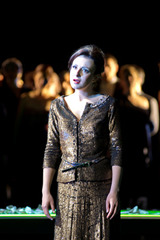| Opera Reviews | 25 April 2024 |
Irina Lungu is an impressive Violettaby Moore Parker |
|
| Verdi: La Traviata Wiener Festwochen 2 June 2012 |
|
|
Deborah Warner's concept was an interesting mélange - updated, unsentimental and with some quirky touches, such as the drag ballet and the bullfighter parody at Flora's party. Her general direction of chorus and actors was innovative and lively, and the character definition for the soloists and their interaction - in particular the heroine - strong and logical. The staging (Jeremy Herbert) offers variety - drawing a full circle from the chilling atmosphere of a quarantined ward (the Act 1 prelude witnesses Violetta's corpse being removed from her hospital bed by masked staff), through a cosy lovers' lair complete with floor cushions and an open fire, to Flora's party with it's chic green-edged illuminated acrylic surfaces for the combined antics of both gamblers and ballet - and back to the clinic for Violetta's farewell. As Violetta, Irina Lungu impresses with her natural, attractive stage presence and an immaculate technique. Her uncontrived vowel colouring and easy blend of registers extend from the occasional anguished chest note though to a solid top E flat and serve that rare ability of going beyond singing the composer's lines with accuracy to realizing and utilizing the notes-between-the notes - evidence of a particular sense of style and musical intelligence. I first doubted the potential size of the instrument, but the voice blossoms out fully above the stave and has apparently adequately filled houses larger than this in major roles. Her stage work is equally impressive - whether joyfully straddling the sofa armrests in Act 1 or lamenting in "Addio del passato" lying on her back in a hospital bed - Lungu appears at ease and at one with the character she is playing. A soprano who deserves more acclaim - and definitely one to watch. Although essentially from the lyrical stable, Saimir Pirgu seemed to rise more to the bait on this occasion in Alfredo's declamatory outbursts, particularly so in his interaction with Germont Père and when denouncing Violetta at Flora's party. Other moments such as "De' miei bollenti spiriti" (the caballeta complete with top C was included, incidentally), or "Parigi o Cara" could have benefited from a more melliferous approach. However, like his soprano colleague, he deserves high praise for a truly clean attack and accurate intonation, which cannot be taken for granted even among more celebrated names. Gabriele Viviani could easily have been Alfredo's bearded brother, judging by his demeanour and bright-timbred baritone. To an even greater extent than his tenor colleague, he seemed bent on producing as many decibels as possible at the expense of tonal and dynamic variation resulting in the impression of a rather blustery one-sided character. Karine Ohanyan played a pert and frisky Flora, and Annina was particularly sympathetically cameoed by Dshamilja Kaiser. The remaining supporting roles were all solidly taken. Familiar to productions in this house, the Arnold Schoenberg Chor were precise, engaged, and an asset as ever. The weak link was in the pit. While stage-to-pit coordination seemed to function throughout, Omer Meir Wellber seemed to draw little beyond the basics from ORF Radio symphony Orchestra in terms of emotion and empathy for the score. Indeed, one wonders if the leading male vocalists might have been tempted to pursue further options under different circumstances. At any rate there was much to enjoy in this production, which sits between last year's Rigoletto and next season's Il Trovatore in the Wiener Festwochen trilogy to mark the 200th anniversary of Verdi's birth. |
|
| Text ©
Moore Parker Photo © Ruth Walz |

 This
Festwochen Traviata proved to be a refreshing alternative to
the ageing and rather dusty State Opera production and presented an
excellent vehicle to introduce the Moldavian soprano Irina Lungu to
the Austrian capital.
This
Festwochen Traviata proved to be a refreshing alternative to
the ageing and rather dusty State Opera production and presented an
excellent vehicle to introduce the Moldavian soprano Irina Lungu to
the Austrian capital. 





